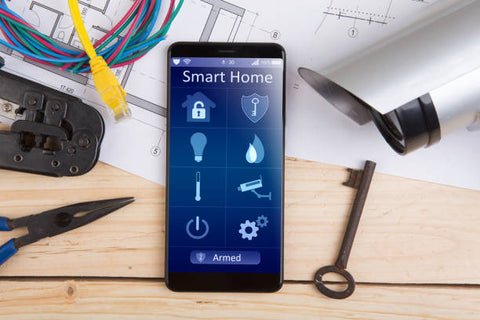What’s the Difference: WiFi Circuit Breaker VS Circuit Breaker

Circuit breakers are an essential component of any electrical system. They protect against overloads, short circuits, and other types of electrical faults that could cause damage to electrical equipment or even fires. With the advancement of technology, WiFi circuit breakers have been introduced, which offer a more convenient and efficient way of managing your electrical system. But what exactly is the difference between a WiFi circuit breaker and a traditional circuit breaker? Let’s explore.
Explanation of circuit breakers and WiFi circuit breakers
Circuit breakers are electrical switches that are designed to protect electrical systems from damage caused by overloads, short circuits, and other electrical faults. They work by detecting abnormal electrical currents and opening the circuit to prevent further damage. They are an essential component of any electrical system, as they prevent electrical fires and protect people from electrical shock.
WiFi circuit breakers are newer breakers that allow you to control and monitor your electrical system remotely using a smartphone app or web interface. They offer increased convenience and accessibility, as well as energy monitoring capabilities.
It is important to understand the differences between traditional breakers and WiFi breakers. It can help to make informed decisions about which type of circuit breaker is best for your needs. While traditional breakers effectively protect electrical systems, WiFi breakers offer increased convenience and accessibility. However, they also come with additional costs and maintenance requirements, and some people may have concerns about their security.
What is a Circuit Breaker?
Definition and function of a circuit breaker
A circuit breaker is an electrical switch designed to protect electrical systems from damage caused by overloads, short circuits, and other electrical faults. When an abnormal electrical current is detected, the breaker interrupts the flow of electricity by opening the circuit, preventing further damage.
How it works
When an electrical fault occurs, the breaker detects the abnormal current and opens the circuit, interrupting the flow of electricity. Once the fault has been corrected, the breaker can be reset to allow the flow of electricity to resume.
What is a WiFi Circuit Breaker?

Definition and function of a WiFi circuit breaker
A WiFi circuit breaker is a type of breaker that allows you to control and monitor your electrical system remotely using a smartphone app or web interface. WiFi breakers connect to your home or office WiFi network and offer increased convenience, accessibility, and energy monitoring capabilities.
How it works
WiFi circuit breakers work by connecting to your home or office WiFi network. They allow you to control and monitor your electrical system remotely using a smartphone app or web interface. They offer increased convenience and accessibility, as well as energy monitoring capabilities.
Advantages and disadvantages of WiFi circuit breakers
One of the primary advantages of WiFi breakers is their remote access and control capabilities. This means that you can monitor and control your electrical system from anywhere using a smartphone app or web interface. WiFi smart breakers also offer increased convenience and accessibility, as they allow you to turn off circuits remotely if necessary. Additionally, some WiFi breakers offer energy monitoring capabilities, allowing you to track your energy usage and identify areas for improvement.
However, WiFi circuit breakers are generally more expensive than traditional breakers, and they may require additional equipment and installation costs. They also require periodic software updates and may require troubleshooting if connectivity issues arise. Additionally, some people may have concerns about the security of their electrical systems when using WiFi breakers, as they are connected to the internet and may be vulnerable to hacking and cyber threats.
IV. Differences Between WiFi Circuit Breakers and Circuit Breakers

1. Basic differences in technology and function
Circuit breakers are electrical switches that automatically cut off the power supply when there is a short circuit or overload in the electrical system. WiFi breakers, on the other hand, can be controlled remotely through a WiFi connection.
2. Comparison of installation, cost, and maintenance
Traditional circuit breakers require professional installation and are typically more affordable than WiFi circuit breakers. They also have a longer lifespan and require less maintenance. WiFi breakers, however, can be installed easily by homeowners and offer the added convenience of remote control. They also tend to have a higher initial cost and require a stable WiFi connection for optimal performance.
3. Features and benefits unique to WiFi circuit breakers
WiFi smart circuit breakers offer unique features such as real-time monitoring of energy usage, customizable alerts and notifications, and the ability to control multiple devices from a single app. They also offer increased safety by allowing users to remotely cut off the power supply in an emergency.
Which Circuit Breaker is Right for You?
Considerations for choosing a circuit breaker
When choosing a circuit breaker, consider factors such as the size and complexity of your electrical system, your budget, and your level of technical expertise. If you have a simple electrical system and do not require a remote control, a traditional breaker may be the best option. If you have a larger system or want the added convenience and safety of remote control, a WiFi breaker may be a better choice.
Pros and cons of each option
Traditional breakers are more affordable, have a longer lifespan, and require less maintenance. However, they do not offer remote control and may be less convenient for larger or more complex systems. WiFi breakers offer the convenience of remote control, real-time monitoring, and increased safety. However, they may have a higher initial cost and require a stable WiFi connection.
Factors to consider when making a decision
Consider your budget, technical expertise, and specific needs when choosing a circuit breaker. Think about the size and complexity of your electrical system and whether remote control is a necessary feature for you.
Conclusion
Circuit breakers and WiFi circuit breakers are both important components of an electrical system, but they have distinct differences in technology, installation, cost, and features. Traditional breakers are more affordable and require less maintenance, while WiFi breakers offer the added convenience and safety of remote control and real-time monitoring.
Ultimately, the right circuit breaker for you depends on your specific needs and budget. Consider the size and complexity of your electrical system, as well as your level of technical expertise, when making a decision. With careful consideration and research, you can choose the breaker that best meets your needs and provides peace of mind for your home or business.
Contact:
sale@at-ele.com



